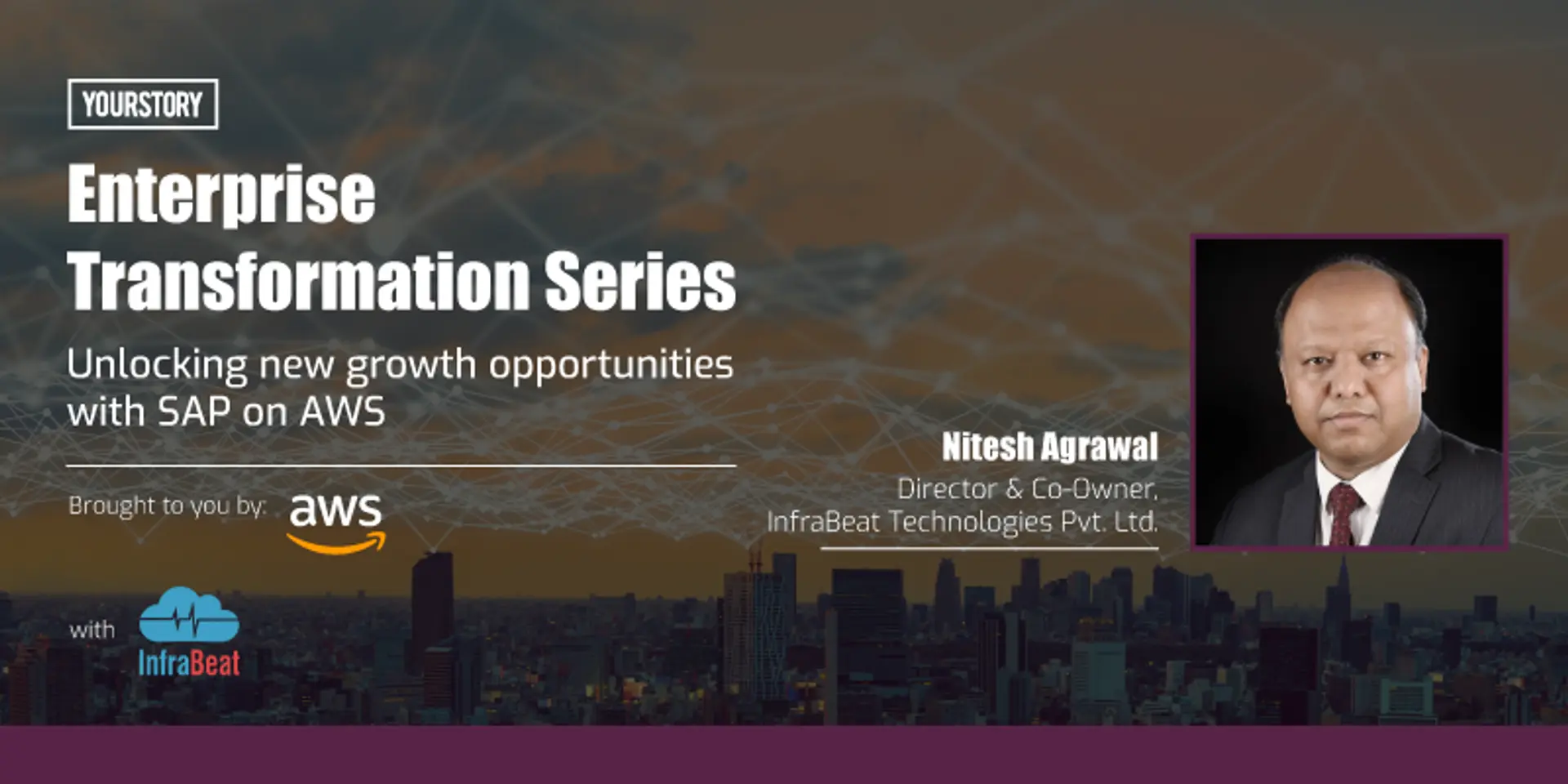1550723198939.jpg?format=auto&w=1920&q=75)
Amazon Web Services
View Brand PublisherEmbracing the power of cloud is vital for business growth: Infrabeat Co-owner
The ‘Enterprise Transformation Series’, hosted in association with AWS, features experts who help enterprises undergo a digital transformation by migrating their on-premise SAP workloads to a cloud platform.
Enterprises have to be agile, get to market faster and more efficiently. In such a demanding business environment, enterprises are migrating their SAP workloads to cloud to enhance performance, simplify operations, and reduce costs.
The ‘Enterprise Transformation Series’, hosted in association with AWS, features experts who have helped enterprises undergo digital transformation by migrating their on-premise SAP workloads to the cloud.
In this episode, Nitesh Agrawal, Director and Co-owner of InfraBeat, gets in conversation with Vishal Krishna, Former Business Editor at YourStory. He makes a case for migrating SAP workloads to a cloud platform because it makes business more conducive to deal with uncertainties. Nitesh also explains how InfraBeat educates its customers about the massive potential of cloud technology through use cases, provides visibility on costs, and gives recommendations on improving efficiency.
Configuration of architecture central to agility
“No one actually knows what will happen in two or three years,” says Nitesh, adding that the rapid rate of technological advancements makes it difficult to install infrastructure with a roadmap of 5-6 years. “ So all assumptions go for a toss after this time period, and people are at a loss as to how to adapt,” he explains.
Nitesh believes cloud technology offers lots of opportunities for growth, innovation and flexibility. “We look at educating customers to help them take full advantage of the cloud in dealing with uncertainties and agility. We encourage them to simply not ‘lift-and-shift’ their on-premise architecture (on the cloud), but also revamp it completely, keeping in mind that customers’ business will also change with time.”
Agility calls for building that approach into the architecture in itself. “And platforms like AWS allow us to do that,” he says.
‘Pay-as-you-go’ pricing models key to cost optimisation
The ‘pay-as-you-go’ business model was the modest feasible payment plan as businesses continue to evolve rapidly, says Nitesh.
“The moment your business lines grow, customers do not shy away from investing when there is growth on the line. When you are working with customers with an agile business growth, pay-as-you-grow becomes sacrosanct in building architecture to re-design at any point of time,” he says.
The importance of use cases in adopting AI/ML technology solutions
Businesses are not aware of how or when to use technologies that are continually released by technology providers, notes Nitesh. “The gap is in the use cases. Our focus is to help create industry specific use cases or build them according to specific requirements and (to solve) pain points.” Towards this end, InfraBeat works with SAP to bring the use cases, create pilots and demonstrations, so that customers get comfortable in handling these technologies. After that, we provide a proof of concept, so that customers can test the technologies before committing to it.” he says.
InfraBeat has a client from the consumer packaged goods (CPG) industry who wanted to integrate their sales orders processed by the distributors. The challenge was to automate the manual uploading of data through SAP. “We managed to have a robotic process automation process built in, which took the client hardly two months (to integrate in their operations), right from conception to testing and going live,” Nitesh says.
Compliance to global standards crucial for security
When it comes to security of operations, Nitesh points to the need to be constantly alert. “Whatever is valid today is not always the case tomorrow,” he says. “The best way (to secure our operations) is by ensuring compliance, and following best practices.”
To that end, Infrabeat works with its clients by going through some reference structures that are designed jointly by SAP and AWS, taking inputs on their needs, and helping clients to set up the necessary security and monitoring infrastructure.
“AWS itself has programs where they carry out a well-architected review to check whether these templates are carried out in execution as well. Being aware of change is essential to implementing security.”
Embracing Cloud technology inevitable for business growth
When asked for advice for businesses aiming to achieve meaningful growth, Nitesh says, “The business reality is that cloud is inevitable. So, it is better to embrace it than to fight it. After all, advantages come in many forms, and you get flexibility. This allows business the ability to focus on their core operations, as opposed to building something from scratch.”



